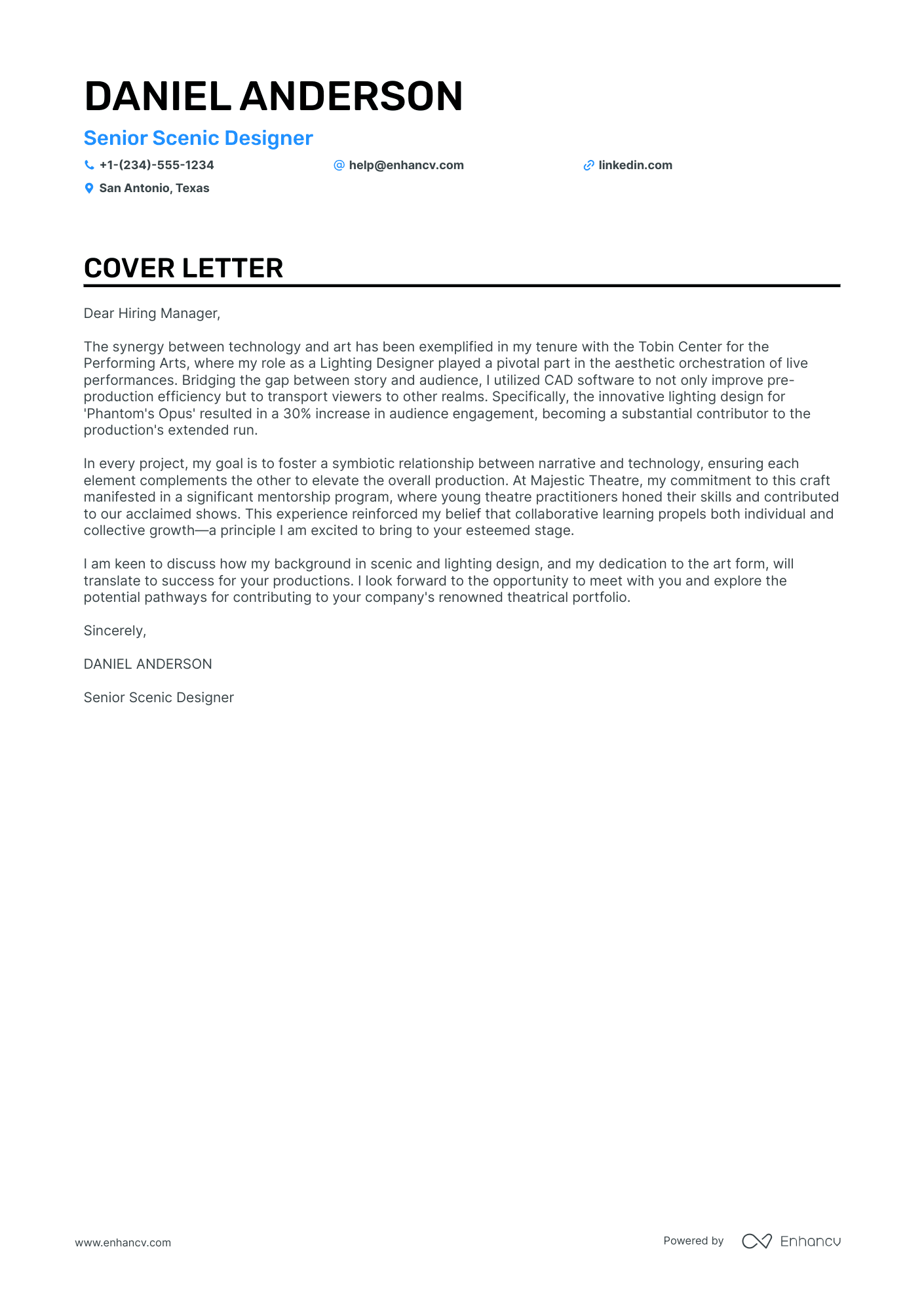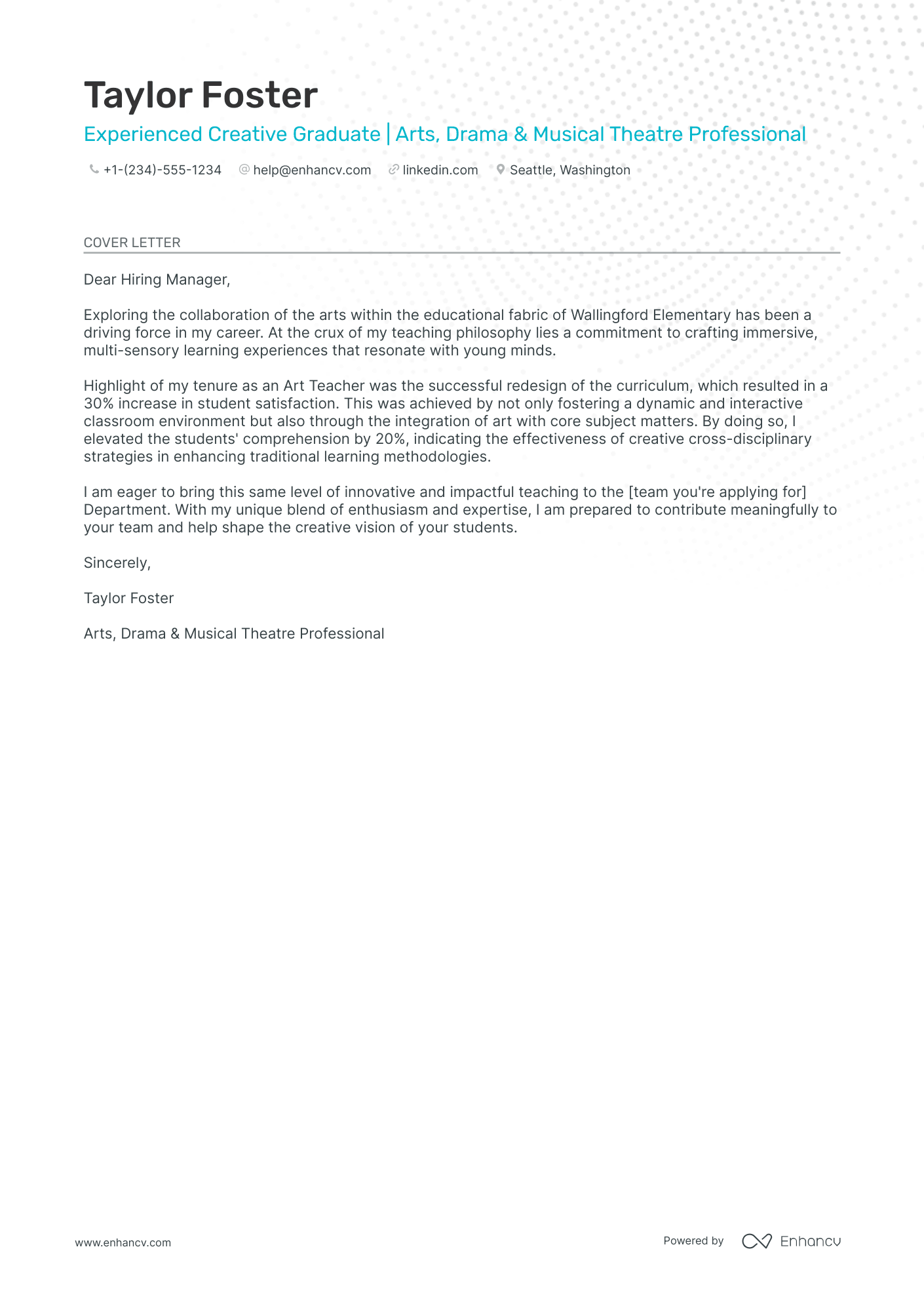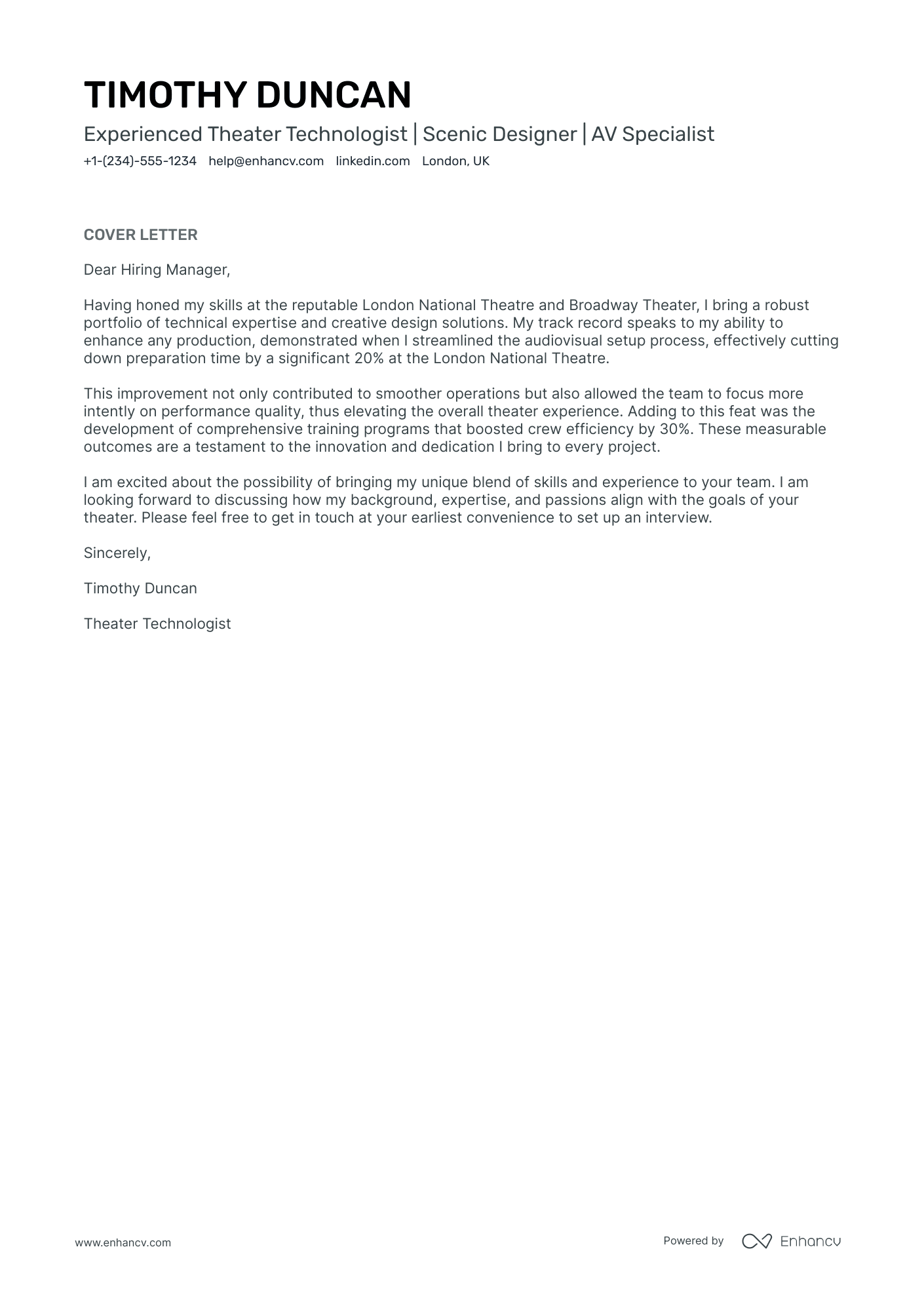Embarking on your theater career, you've diligently filled applications and now you're faced with crafting a compelling cover letter. It's not just about repeating your resume; it’s your chance to shine a spotlight on that one grand act of your professional journey. Striking the right balance between formality and genuine narrative can be tricky, avoiding tired clichés while keeping it to one page. Let's unveil how you can write a theater cover letter that commands a standing ovation.
- Personalize your theater cover letter and get inspired by other professionals to tell a compelling story;
- Format and design your theater cover letter to make an excellent first impression;
- Introduce your best achievement in your theater cover letter to recruiters;
- How to make sure recruiters get in touch with you, using your theater cover letter greeting and closing paragraphs.
What is more, did you know that Enhancv's AI can write your cover letter for you? Just upload your theater resume and get ready to forward your job application in a flash.
If the theater isn't exactly the one you're looking for we have a plethora of cover letter examples for jobs like this one:
Drop your resume here or choose a file.
PDF & DOCX only. Max 2MB file size.
Theater cover letter example
OLIVIA DAVIS
Philadelphia, Pennsylvania
+1-(234)-555-1234
help@enhancv.com
- Emphasizing specific achievements, such as developing a digital management system, showcases the candidate's ability to innovate and improve efficiency, which is crucial in event coordination roles.
- Quantifying success, as seen with the 30% reduction in preparation time and a 25% increase in attendee numbers, provides concrete evidence of the candidate's impact and effectiveness in their previous role.
- Demonstrating how skills and experience will directly benefit the potential employer, by expressing eagerness to apply strategic use of technology and experience to elevate the production experience at the new company.
Five tips on formatting your theater cover letter
Do you want to make a good impression on recruiters and, at the same time, follow the best industry advice on writing your theater cover letter?
Make sure to include the following:
- Header and Salutation;
- Introductory paragraph;
- Body paragraph;
- Closing paragraph;
- Signature (this one is up to you).
Remember to use the same modern, simple font for your theater cover letter as you did for your resume (e.g. Lato, Rubik, etc.)
Ensure your theater cover letter is single-spaced and is wrapped around a one-inch margin, like in our cover letter templates.
Once completed, use our cover letter builder to export your theater cover letter in the best format to keep your information intact - PDF.
At the end of the day, your theater cover letter won't be assessed by the Applicant Tracker System (ATS) software, but by the recruiters. Your information should thus be legible, organized, and follow a structured logic.
Writing cover letters just got easier. Use our free cover letter generator to create yours instantly.
The top sections on a theater cover letter
- Header: This should include the candidate's contact information, the date, and the recruiter's details; it is crucial for ease of reference and to show professionalism in correspondence.
- Greeting: A personalized greeting to the hiring manager shows attention to detail, a key trait for theater roles, as it indicates the candidate has researched who will read their application.
- Introduction: The intro must capture the recruiter's interest immediately by expressing the candidate's passion for theater and the specific role they are applying for, revealing a personal connection to the arts.
- Professional Highlights: In this section, the candidate should concisely outline their most relevant theater experience and achievements, linking their skills directly to the job description to demonstrate they can meet the theater company's needs.
- Closing: A strong closing reiterates the applicant's enthusiasm for the position, their willingness to further discuss their suitability for the role in an interview, and thanks the recruiter for considering their application, showing both courtesy and eagerness.
Key qualities recruiters search for in a candidate’s cover letter
- Strong stage presence and charisma: Being able to captivate an audience and command attention is essential for performers on stage.
- Versatility in acting, singing, and dancing: The ability to excel in multiple aspects of performance makes a candidate more valuable for various roles and productions.
- Experience with live performances: Demonstrates the capability to handle the pressure and unpredictability of performing in front of an audience.
- Ability to take direction and adapt: Shows that the candidate can collaborate well with directors and adjust their performance based on feedback.
- Understanding of theater terminology and stagecraft: Indicates that the applicant can communicate effectively with other professionals involved in the production.
- Physical stamina and vocal endurance: Being able to perform consistently through long rehearsals and multiple shows is critical for maintaining the quality of the performance.
How to start your theater cover letter: with a greeting, of course
Have you ever considered just how powerful a personalized salutation can be?
We sure have news for you! Your theater cover letter should start with the right salutation to recruiters, nurturing a sense of respect and individuality.
Greet recruiters by using their first name (e.g. "Dear Tom" or "Dear Patricia") if you've previously established contact with them.
Otherwise, opt out for the less familiar, "Dear Ms. Peaches" or "Dear Ms Kelsey", if you've found the recruiter's name on LinkedIn or a corporate website.
"To whom it may concern" is never a good option, as it creates a sense that you've been sending out your theater cover letter to anyone. Instead, use "Dear HR team" or "Dear (company name) recruiter" for a feeling of exclusivity.
List of salutations you can use
- Dear [Name of Hiring Manager],
- Dear [Name of the Artistic Director],
- Dear [Theatre Company Name] Team,
- Dear Members of the [Theatre Company Name],
- Dear [Name of the Production Manager],
- Dear [First Name Last Name] [Title],
The theater cover letter intro: aligning your interest with the company culture
You only have one chance at making a memorable first impression on recruiters with your theater cover letter.
Structure your introduction to be precise and to include no more than two sentences.
Here are some ideas on how to write a job-winning theater cover letter introduction:
- get creative - show off your personality from the get-go (if this aligns with the company culture);
- focus on your motivation - be specific when you say what gets you excited about this opportunity.
What to write in the middle or body of your theater cover letter
Here's where it gets tricky.
Your theater cover letter body should present you in the best light possible and, at the same time, differ from your resume.
Don't be stuck in making up new things or copy-pasting from your resume. Instead, select just one achievement from your experience.
Use it to succinctly tell a story of the job-crucial skills and knowledge this taught you.
Your theater cover letter is the magic card you need to further show how any organization or team would benefit from working with you.
Closing remarks to end your theater cover letter
Of course, you'll have to show gratitude to the recruiters, who have assessed your profile at the end of your theater cover letter .
A "Thank you for the consideration" would work wonders, instead of the standard "Sincerely yours".
Do you want to make an even better impression?
Close off your theater cover letter by promising how you see yourself excelling in the role and the positive impact you'd bring about.
A sentence that encourages some further action on the recruiter's end could also be a good way to close off the communication (e.g. provide your availability for an interview).
Addressing limited to no experience in the theater cover letter
There's nothing to worry about if you lack professional experience.
Your theater cover letter could bridge the gaps in your professional history by focusing on what matters most to recruiters, that's either:
- skills - focusing on transferable ones you've gained, thanks to your life experience (e.g. volunteering, certificates, etc.);
- achievements - select the most relevant and noteworthy one from your history (e.g. education, projects, etc.);
- motivation - describe how you envision your professional growth in the next up to five years, thanks to this opportunity.
Key takeaways
Writing your theater cover letter has never been easier, so remember to:
- Select a theater cover letter template that automatically meets industry formatting (e.g. has one-inch margins, is single-spaced, is in PDF, etc.);
- Make your theater cover letter personal by mentioning the recruiters' first or last name;
- Within the introduction, describe what you like best about the company in no more than two sentences;
- Use your theater cover letter body to tell a story of your greatest achievement, backed up by job-relevant skills and technologies;
- If you have no professional experience, be honest about it in your theater cover letter, but also write about your unique talents.
Theater cover letter examples
By Role







